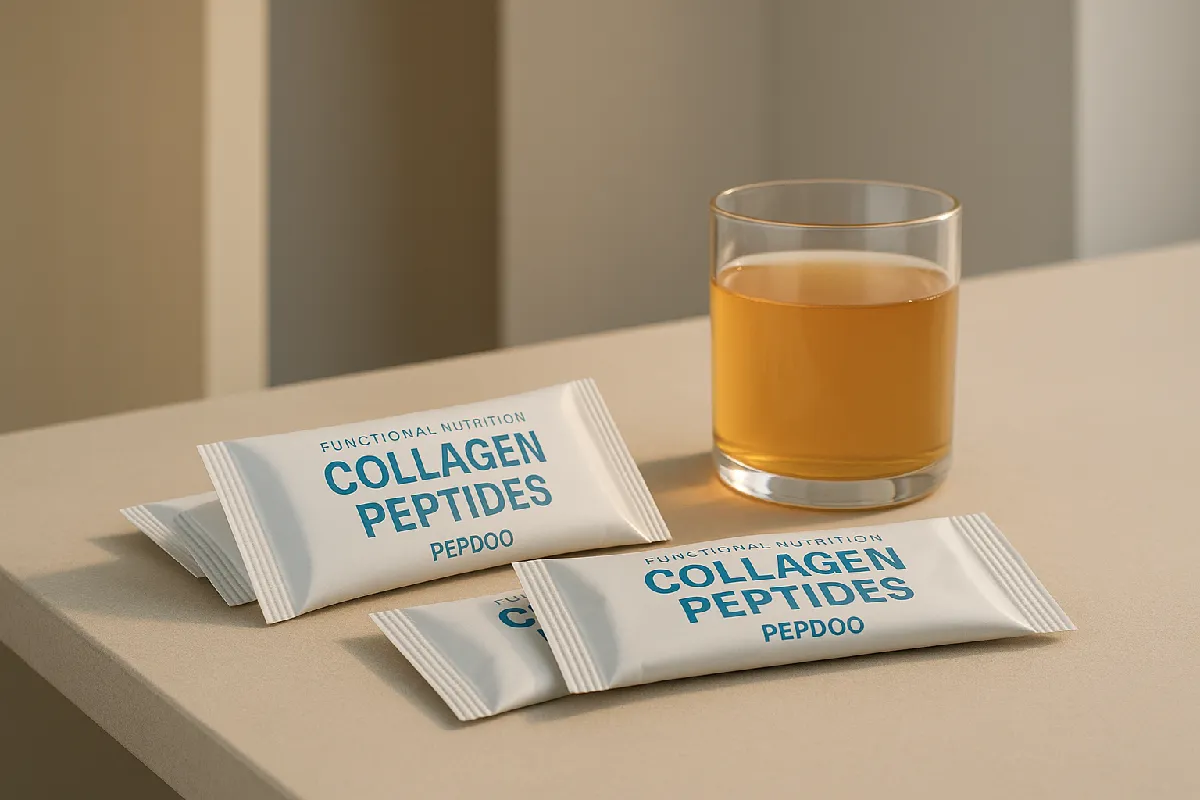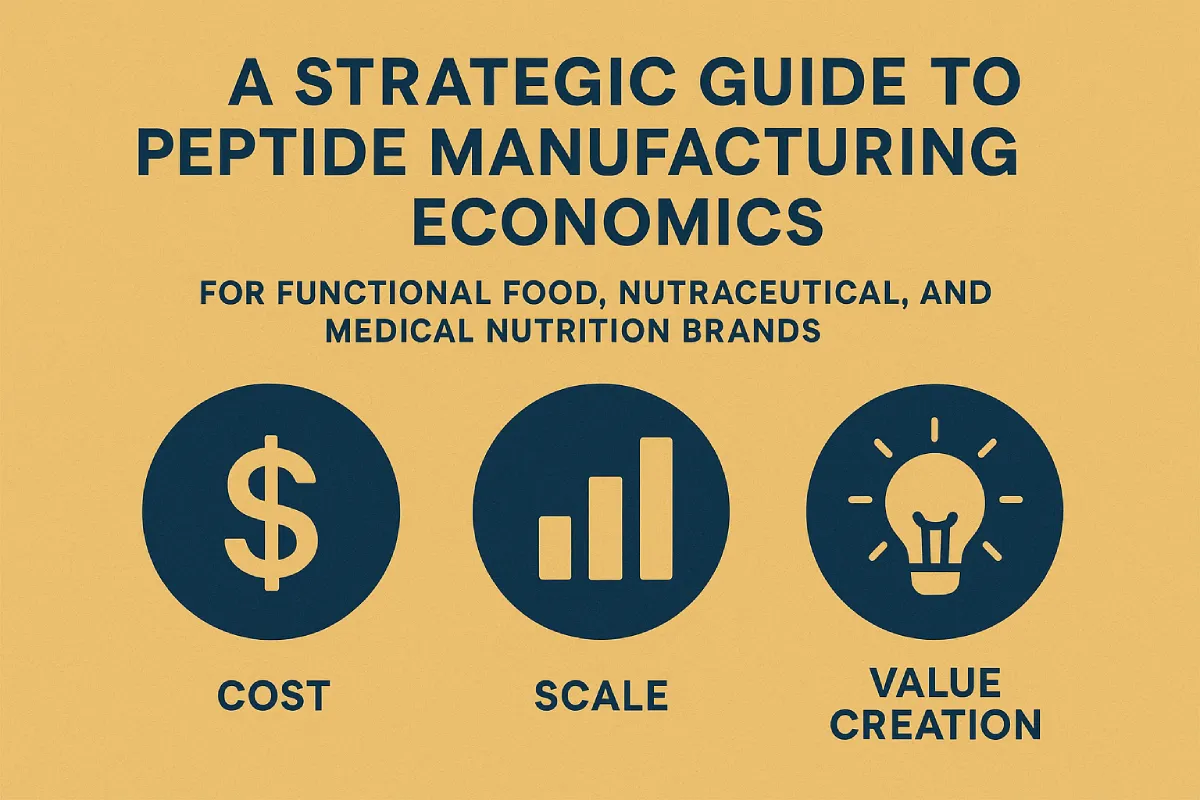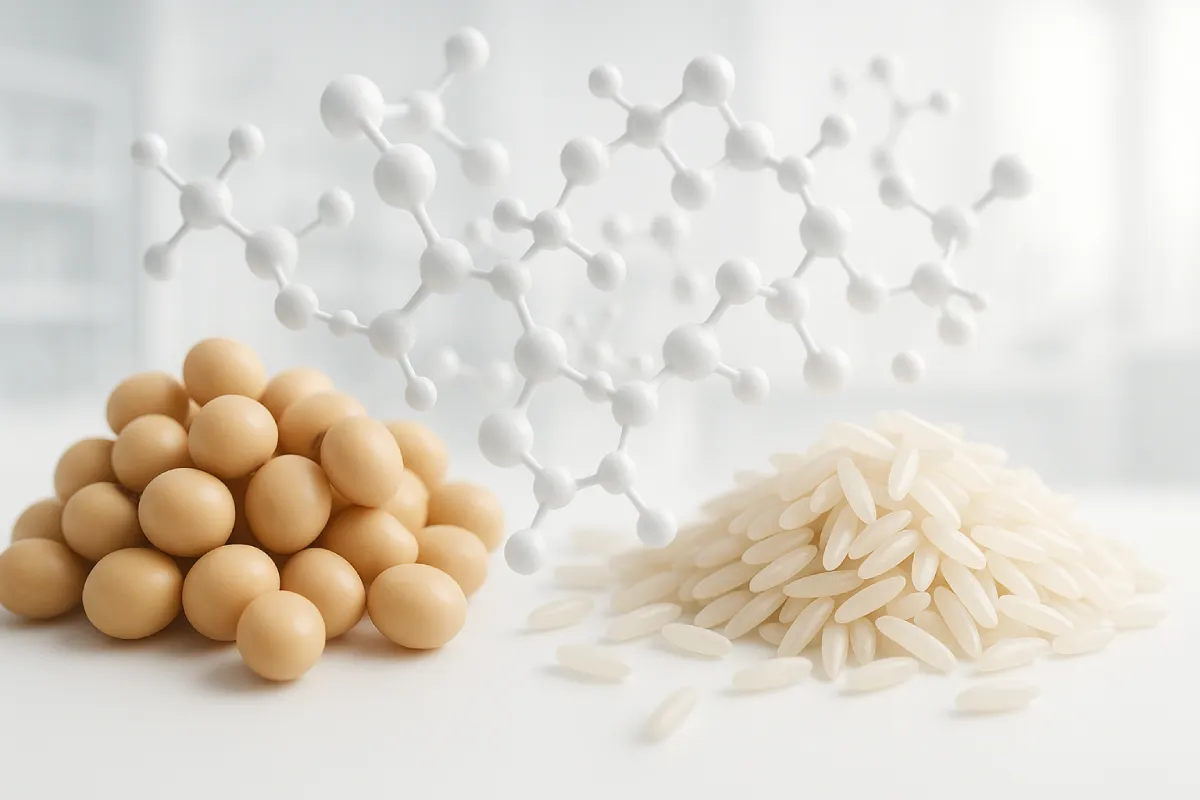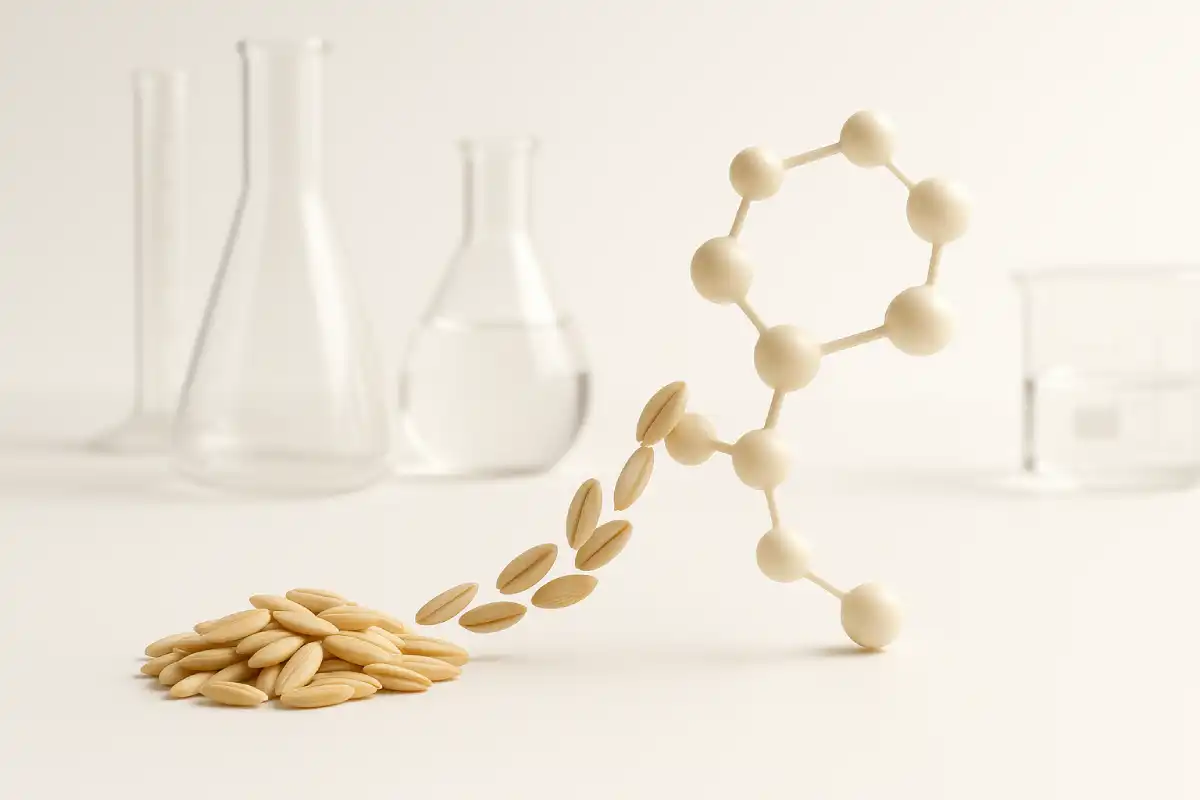Why Pea Peptides Are the Rising Star in Vegan Nutrition
The global plant-based protein market has experienced unprecedented growth in recent years, driven by increasing consumer awareness of health, sustainability, and dietary preferences. Among the various plant-derived proteins, pea peptides have emerged as a key functional ingredient for vegan nutrition, offering superior digestibility, high bioavailability, and low allergenicity. For B2B clients—including functional food manufacturers, dietary supplement brands, and medical nutrition developers—understanding the benefits and applications of pea peptides is essential for product innovation and market competitiveness.
Our company, as a full-range peptide manufacturer, is recognized as a Chinese industry standard setter in peptide production, with top-tier small molecule peptide patents and cutting-edge hydrolysis technologies. These capabilities ensure consistent supply and quality, enabling brands to develop innovative products with confidence.
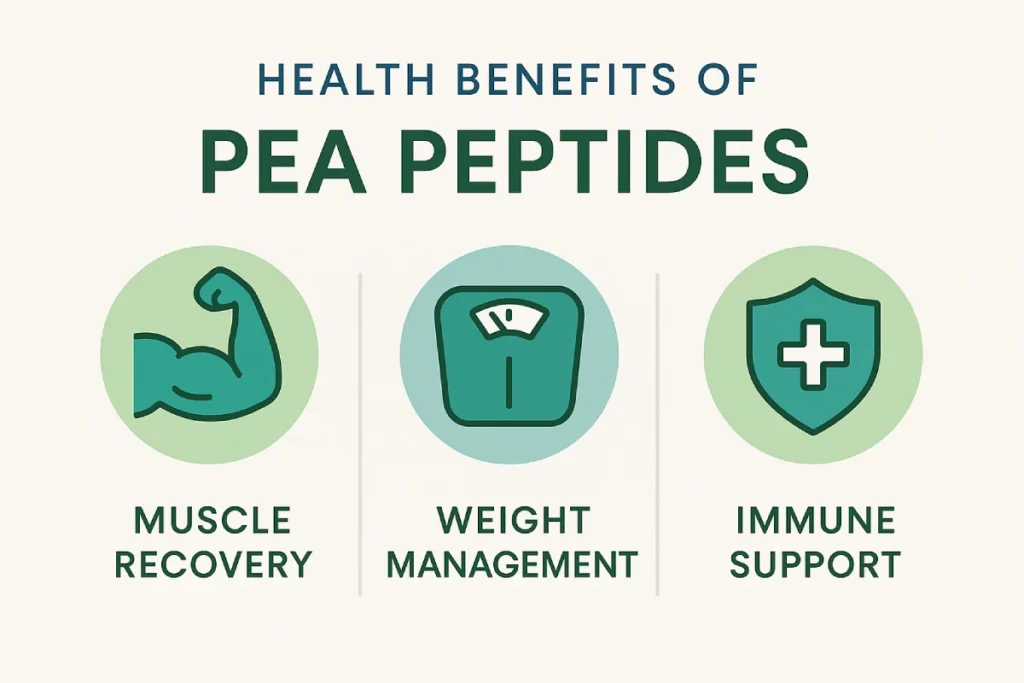
What Makes Pea Peptides Ideal for Functional Foods and Supplements
Pea peptides are derived from hydrolyzed pea protein, resulting in small molecular weight peptides that are quickly absorbed and metabolized in the human body. Compared to other plant proteins, such as soy or rice protein, pea peptides offer several advantages:
- High digestibility and absorption: Small peptides are easily absorbed in the gut, providing fast and efficient delivery of essential amino acids.
- Low allergenicity: Unlike soy, pea peptides are hypoallergenic, suitable for sensitive populations.
- Versatility: They can be used in beverages, protein bars, ready-to-drink formulations, and specialized medical nutrition products.
Case study: An international functional beverage brand incorporated pea peptides into its protein drink line, improving both protein content and taste profile, resulting in a 20% increase in repeat purchase rate.
Global Market Trends and Growth Opportunities for Pea Peptides
The plant-based protein and functional nutrition markets are expanding rapidly, with projected CAGR of 7–9% through 2030 in North America and Europe [1]. Consumer trends favor plant-based, sustainable, and health-promoting ingredients, which positions pea peptides as a high-demand functional component.
Case study: A European dietary supplement company introduced a high-protein pea peptide bar targeted at vegan athletes. The product achieved a 25% sales growth within six months, highlighting the commercial potential for B2B clients.
As a leading peptide supplier in China, our company ensures reliable sourcing, GMP-compliant production, and adherence to international quality standards. Brands seeking to innovate in functional foods or dietary supplements can leverage our technical expertise to capitalize on these market trends.
Health Benefits of Pea Peptides in Vegan Nutrition
Pea peptides are associated with multiple functional benefits:
- Muscle recovery and performance: Rich in branched-chain amino acids (BCAAs), pea peptides support post-exercise muscle synthesis.
- Weight management: Pea peptides promote satiety and regulate appetite hormones.
- Cardiovascular support: Research suggests bioactive peptides from peas can help maintain healthy blood pressure levels [2].
- Immune support: Certain peptide fractions demonstrate immunomodulatory effects, beneficial for general wellness.
Case study: A domestic medical nutrition company integrated pea peptides into specialized formulas for hospital use, achieving clinical validation and regulatory approvals, thereby establishing a strong B2B channel in medical nutrition.
Formulation Strategies and Manufacturing Advantages
For B2B clients, the practical application of pea peptides depends on formulation compatibility, stability, and sensory properties:
- Versatility in formulations: Suitable for beverages, powders, bars, and specialized nutrition products.
- Stability and solubility: Optimized hydrolysis ensures minimal bitterness and high solubility.
- Synergy with other peptides: Pea peptides can be combined with collagen peptides, soy peptides, or functional extracts to enhance overall product efficacy.
Our full-range peptide manufacturing capability and advanced enzymatic hydrolysis technology allow brands to access high-quality pea peptides consistently. Case study: Collaboration with multiple international nutrition brands has optimized flavor profiles and enabled large-scale production for protein-enriched beverages and bars.
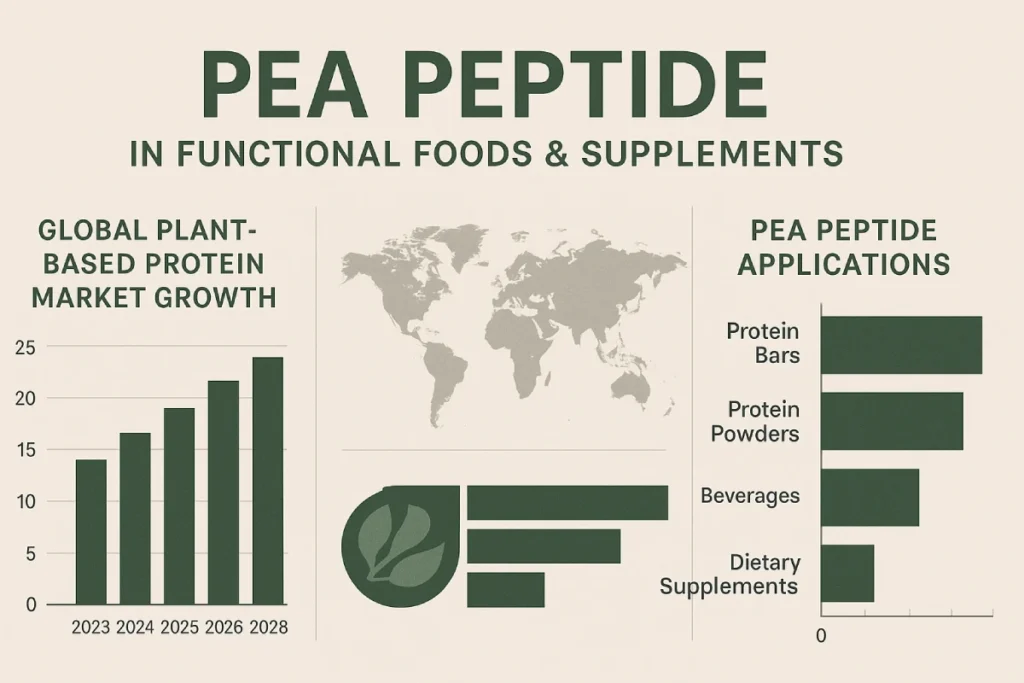
Business Value for B2B Clients
Choosing pea peptides offers clear commercial advantages:
- Differentiation: Plant-based, hypoallergenic, and high bioavailability ingredients stand out in the market.
- Sustainable sourcing: Supports corporate ESG and sustainability goals.
- Innovation potential: Enables the creation of new functional products targeting vegan, sports nutrition, and medical segments.
Case study: A global functional food brand launched a premium line of plant-based protein products using our pea peptides. The product achieved high-margin sales in health-focused markets, demonstrating the value of partnering with an experienced peptide supplier.
Future Innovations and Market Outlook for Pea Peptides
The future of pea peptides is promising, with growing interest in:
- Peptide combinations: Enhancing bioactivity through strategic blends.
- Function-focused formulations: Targeting weight management, cardiovascular health, or immune support.
- Global adoption: Expanding into Asia-Pacific and emerging markets as plant-based nutrition gains popularity.
As a Chinese leader in peptide innovation, our company continues to drive international standards, patent development, and application research, empowering B2B clients to stay ahead of market trends.
Conclusion & Actionable Insights for Functional Nutrition Brands
Pea peptides represent a strategically valuable ingredient for vegan and plant-based functional nutrition products. Their high bioavailability, versatility, and functional benefits make them ideal for beverages, protein bars, supplements, and medical nutrition.
Partnering with a reliable, full-range peptide manufacturer—a Chinese industry standard setter with top-tier small molecule peptide patents—ensures consistent quality, supply stability, and access to cutting-edge technologies. Brands can leverage these advantages to differentiate products, innovate, and meet the growing demand for plant-based functional nutrition.
Call to Action: Contact our peptide experts to request samples, explore custom formulations, or download our whitepaper to learn more about leveraging pea peptides for your next product line.
Unlock the Power of Pea Peptides for Your Products
Partner with a full-range peptide manufacturer and industry leader in small molecule peptides. Access patented technologies, stable supply, and formulation expertise to accelerate your product innovation.
Contact UsFAQ
Pea peptides are plant-based, hypoallergenic, and easy to digest, making them ideal for vegan functional foods and dietary supplements. Compared to soy peptides, they have lower allergenicity. Compared to whey peptides, they are suitable for vegan and lactose-intolerant consumers. Their small molecular weight ensures rapid absorption and higher bioavailability for functional nutrition applications.
Pea peptides can be incorporated into protein beverages, nutrition bars, ready-to-drink formulas, powdered supplements, and specialized medical nutrition products. They are compatible with other bioactive ingredients like collagen peptides or functional extracts, allowing formulation of multi-functional products targeting muscle recovery, weight management, and cardiovascular health.
Our company applies advanced enzymatic hydrolysis and flavor optimization techniques to produce pea peptides with high solubility and minimal bitterness. This ensures seamless integration into beverages, powders, and bars without affecting texture or taste, making it easier for B2B clients to develop consumer-accepted products.
Choose suppliers with a proven track record in full-range peptide production, industry standard-setting experience, and multiple small molecule peptide patents. Verify capabilities for consistent supply, quality control (GMP-compliant), and technical support for formulation and product development. Partnering with such suppliers reduces development risks and accelerates time-to-market.
Yes. Pea peptides are hypoallergenic, plant-based, and highly bioavailable, making them ideal for medical nutrition, infant nutrition, and other specialized dietary products. They can meet regulatory requirements and align with hospitals or clinical nutrition programs, offering B2B clients access to high-value distribution channels.
Absolutely. Pea peptides can be synergistically blended with collagen peptides, soy peptides, or other functional extracts to create multi-functional nutrition products. Proper formulation ensures stability, efficacy, and desirable sensory properties, providing B2B clients with a flexible ingredient for innovative product development.
References
- Grand View Research. (2023). Plant-based protein market size, share & trends analysis report, 2023–2030.
- Udenigwe, C. C., & Aluko, R. E. (2012). Food protein-derived bioactive peptides: Production, processing, and potential health benefits. Journal of Food Science, 77(1), R11–R24.


